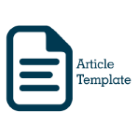The Journal of Law and Governance (eISSN:2637-0743) is a fully referred journal published annually by the Universiti Islam Melaka (UNIMEL) Publisher in collaboration with the Faculty of Law, Governance and International Relations, UNIMEL. Its main objective is to provide a platform for publication of local or international research based articles in laws, governance and international relations.
The journal is indexed in Google Scholar and MyJurnal.


Announcements
ABOUT 'JOURNAL OF LAW & GOVERNANCE' |
|
This section provides a comprehensive overview to help potential authors, reviewers, and readers understand the journal’s mission, standards, and processes. CLICK HERE TO VIEW ABOUT THIS JOURNAL. |
|
| Posted: 2024-07-01 | |
PEER-REVIEW PROCESS TIMELINE |
|
This timeline is applicable for all UNIMEL's journals. CLICK HERE TO REVIEW. |
|
| Posted: 2024-07-01 | |
PUBLICATION ETHICS |
|
Journal publication ethics refers to a set of principles and standards designed to guide the conduct of authors, reviewers, editors, and publishers in the process of producing and disseminating scholarly work. These ethics ensure the integrity, transparency, and credibility of academic research and publications. CLICK HERE TO READ PUBLICATION ETHICS. |
|
| Posted: 2024-07-01 | |
| More Announcements... |
Vol 7, No 1 (2024): JOURNAL OF LAW AND GOVERNANCE
Table of Contents
Articles
|
Anisah Che Ngah
|
1-10
|
|
Isman Isman, Ahmad Ashari Ashshidiq, Farida Arianti, Yusuf Rahmat Yanuri
|
11-28
|
|
Hastuti Olivia, Isra Hayati, Ahmad Afandi, Abu Daud, Fawazra Athalla Pasha
|
29-37
|
|
Rahmayati Rahmayati, Afif Badawi
|
38-44
|
|
STUDY OF THE FALAKIYAH FATWAS OF THE INDONESIAN ULEMA COUNCIL
Muhammad Rasyid, Muhsin Aseri, Ahmad Izzuddin, Muhamad Syazwan Faid, Akh. Fauzi Aseri, Sukarni Sukarni
|
45-62
|
|
Muhammad Hidayat, Abu Yazid Raisal, Marataon Ritonga, Syahrul Amsari
|
63-72
|
|
Nurul Aliana Mohd Hanafi, Mohd Nasir Abdul Majid
|
73-94
|
|
Sharifah Umairah Datu Asal, Nurhidayah Samsul, Nur Khairunnisa Najwa Hamdan, Ahmad Azam Mohd Shariff, Mohamad Azhan Yahya, Mohd Sabree Nasri
|
95-109
|
|
Amirul Ammar Anuar, Ahmad Azam Sulaiman @ Mohamad, Mohammad Taqiuddin Mohamad
|
110-131
|
|
Mustafa Mat Jubri Shamsuddin
|
132-146
|
|
Nuarrual Hilal Md Dahlan
|
147-159
|
|
Hamdino Hamdan, Nurfarahana Salim
|
160-174
|
|
Nisar Mohammad Ahmad, Dina Imam Supaat
|
175-185
|
|
Siti Amalina Ahmad Khairundin, Shahidra Abdul Khalil, Syed Mohd Jeffri Syed Jaafar, Mumtazah Narowi, Noor Fadhzana Mohd Noor
|
186-205
|
|
Ramizah Wan Muhammad, Muhammad Firdaus A. Mokhlis
|
206-213
|
|
Sa’odah Ahmad, Mohammad Arif Johari, Rojanah Kahar, Muslihah Hasbullah, Elistina Abu Bakar
|
214-225
|
|
Nurfadhilah Che Amani, Rojanah Kahar, Muslihah Hasbullah
|
226-242
|
|
Muslihah Hasbullah, Sa’odah Ahmad, Rumaya Juhari, Zainal Madon, Asmidah Ahmad, Noor Yasmin Ramlan
|
243-252
|
|
Ozdemir Selman Zahid
|
253-260
|
|
Najwa Azizun, Amylia Fuziana Azmi, Azni Mohd Dian, Azhani Arshad
|
261-271
|




